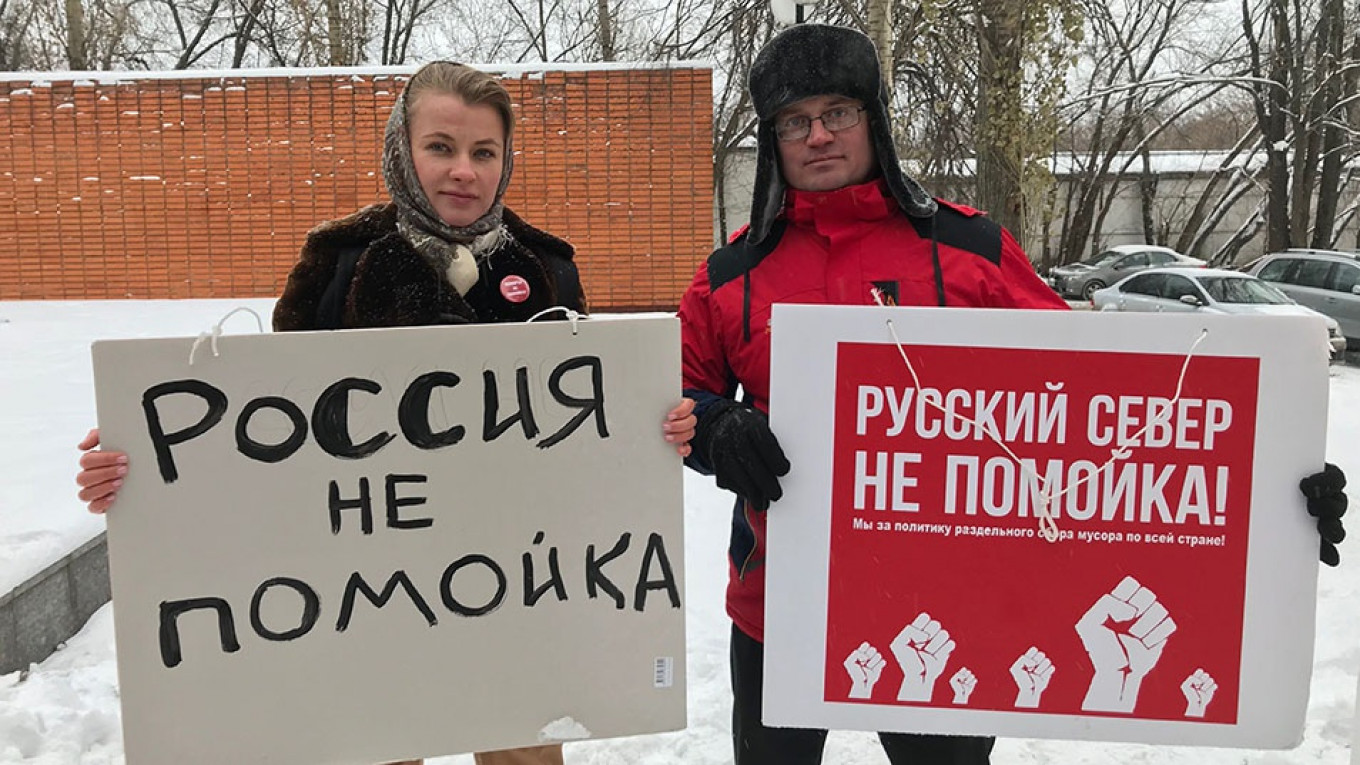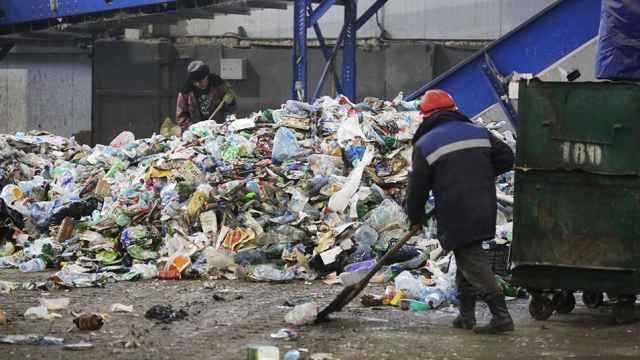On a snowy Sunday morning, around 100 people gathered just outside Moscow in front of a memorial to the revolutions of 1905 and 1917. The revolutions, which toppled Russia’s last tsar and launched the Soviet Union, were commemorated by a metal red flag engraved with the word “Freedom.”
The Dec. 9 gathering was organized by Dmitry Shuvalov, a Moscow deputy who balloted with the Communist Party in last year’s elections. But if his chosen location was meant to inspire revolution, it was not of the kind that brought the Bolsheviks to power.
Shuvalov, who represents the Nekrasovka district on the southeastern edge of the city, had come with local residents, activists and fellow politicians to protest City Hall’s plan for handling the capital’s waste — nearly one fifth of the country’s total output.
The question resonates particularly with Nekrasovka residents because the district is home to one of four new so-called “ecoclusters” — or packing facilities — where much of the capital’s trash will be compressed into bales. The bales will then be shipped to so-called “ecotechnoparks” — or storage facilities — across Russia. Officials have not yet announced when the new system will begin functioning, but preparations are barrelling ahead.
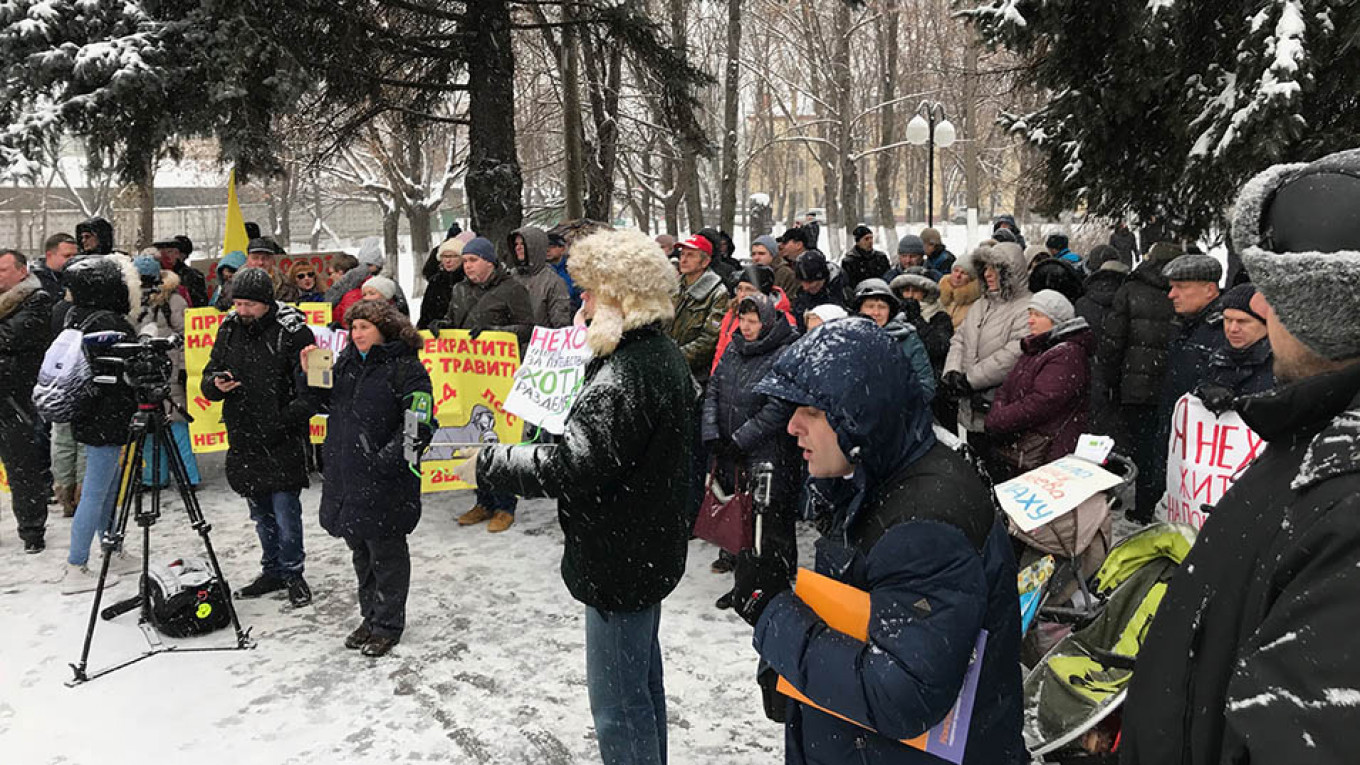
For the protestors, City Hall’s plan amounted not to a solution, but a shifting of its burden to others.
“We want Moscow’s budget to be spent on sorting and recycling, just like in the rest of Europe,” Shuvalov explained. “We don’t want to be soiling the rest of Russia.”
Calls for sustainable waste management by private citizens have grown increasingly loud over the past year. So has their anger. In part, residents suspect that official plans for waste management are masquerading as sustainable while effectively hiding problems from view. But they also feel that their demands have been falling on deaf ears.
Sunday’s protests followed mass demonstrations in the northern region of Arkhangelsk a week earlier. Officials there have so far announced that 500,000 tons of Moscow's waste will eventually be sent to the region, a move which drew 30,000 people onto the streets, protest organizers said.
The day after the Dec. 2 demonstrations in Arkhangelsk, the region’s governor Igor Orlov said that the protestors did not represent the full population and that the region would continue to do whatever it could to help out Moscow. On Tuesday, Orlov denied a request by protest organizers for a referendum.
“The main issue really is that the authorities never ask us what we want,” says Dmitry Sekushin, one of the Arkhangelsk protest organizers. “They treat us like livestock.”
Shifting a problem elsewhere
The decision to send trash out of Moscow came as the country slid into an acute garbage crisis earlier this year.
Thousands had turned out across the Moscow region this spring to protest the continued use of overflowing, Soviet-era dumps. The protests reached their peak in March when doctors linked the hospitalizations of nearly 60 children in a town outside Moscow to noxious gases emanating from a nearby landfill.
In June, federal officials said that landfills in 10 regions around the country were facing “catastrophic” overflows. They also said that the strained dumps were putting at risk the health of 17 million Russians.
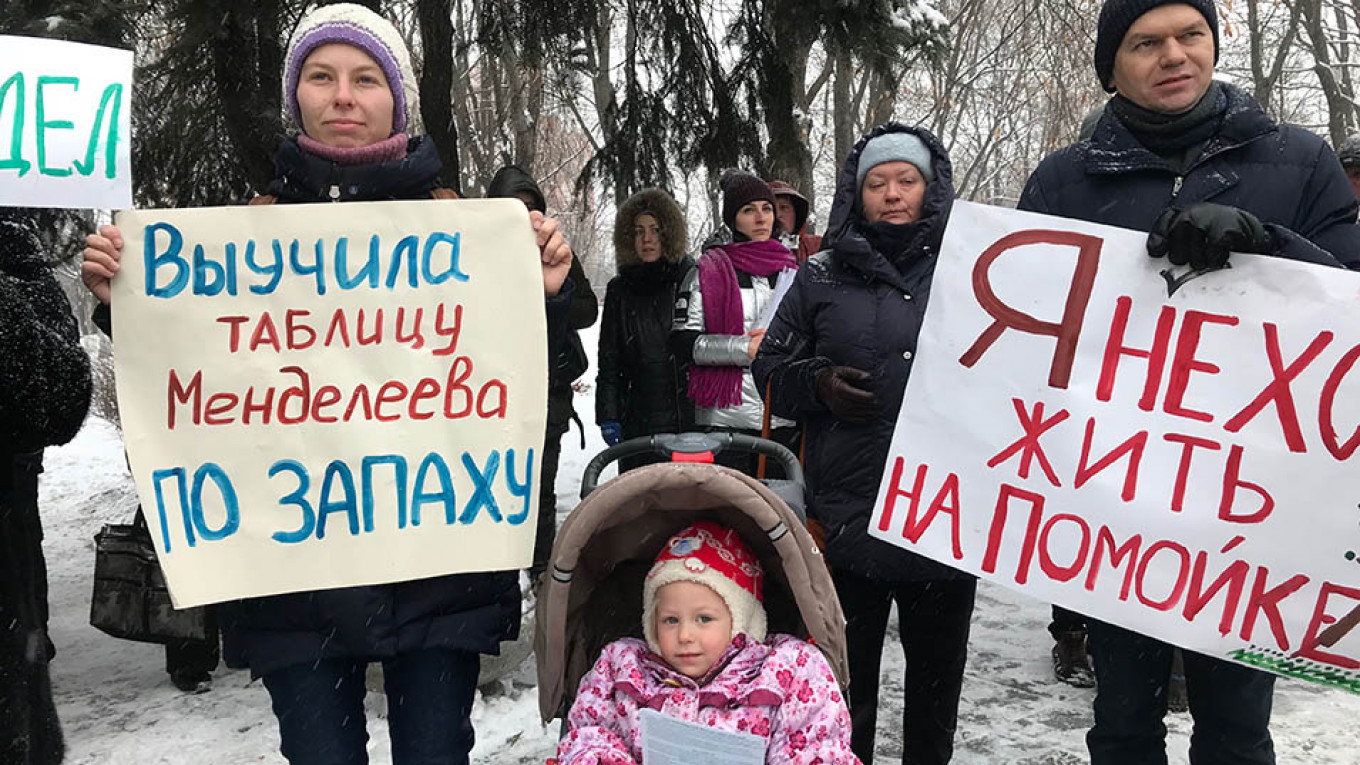
To quell growing anger, the authorities moved to shutdown controversial landfills in the Moscow region. But they still needed to redirect the 6.6 million tons of waste that the capital was dumping on the surrounding region.
Over the summer and into the fall, protests sprouted up in towns and regions around Moscow and as far as Arkhangelsk as activists uncovered what they thought were official plans to build new landfills, rather than find a sustainable solution to the waste crisis.
But in mid-October, Arkhangelsk officials announced that what activists there had thought was a new landfill adjacent the Shies train station deep in the forest was actually an ecotechnopark which would store Moscow’s waste.
Last month, the Meduza news outlet reported that officials have also identified another site in Arkhangelsk, and in Kaluga, Kostroma and Yaroslavl to build additional ecotechnoparks.
Officials have said that the Shies storage facility will be able to take in 500,000 tons of garbage per year, and that it will able to be stored for 20 years. Neither officials nor a video advertising the Shies project have explained what will eventually be done with the trash.
The lack of specifics has left an already skeptical public believing that the authorities are only selling a landfill cloaked in fancy terms. Their paranoia has only increased with officials having left them in the dark.
“No one trusts our authorities — and for good reason,” says Vladimir Kuznetsov, the director of the Moscow-based Center for Ecological Initiatives. “For years they have been using these horrible waste management methods. Why should people believe they’ll suddenly change now?”
Repurposing European technology
Bo Anjsber sold his first waste baling machine to Russia two decades ago. Then he sold two more in 2003. But over the next 15 years, the Swede had trouble attracting further interest.
In a country where dumping unsorted garbage into landfills had long been the norm, Anjsber’s technology for efficiently transporting trash to processing plants was seen as superfluous, says his director of sales for Russia and the former Soviet Union.
“People would laugh in my face when I would explain what we were selling,” Valery Sepatov, a St. Petersburg native who is based in Stockholm, told The Moscow Times.
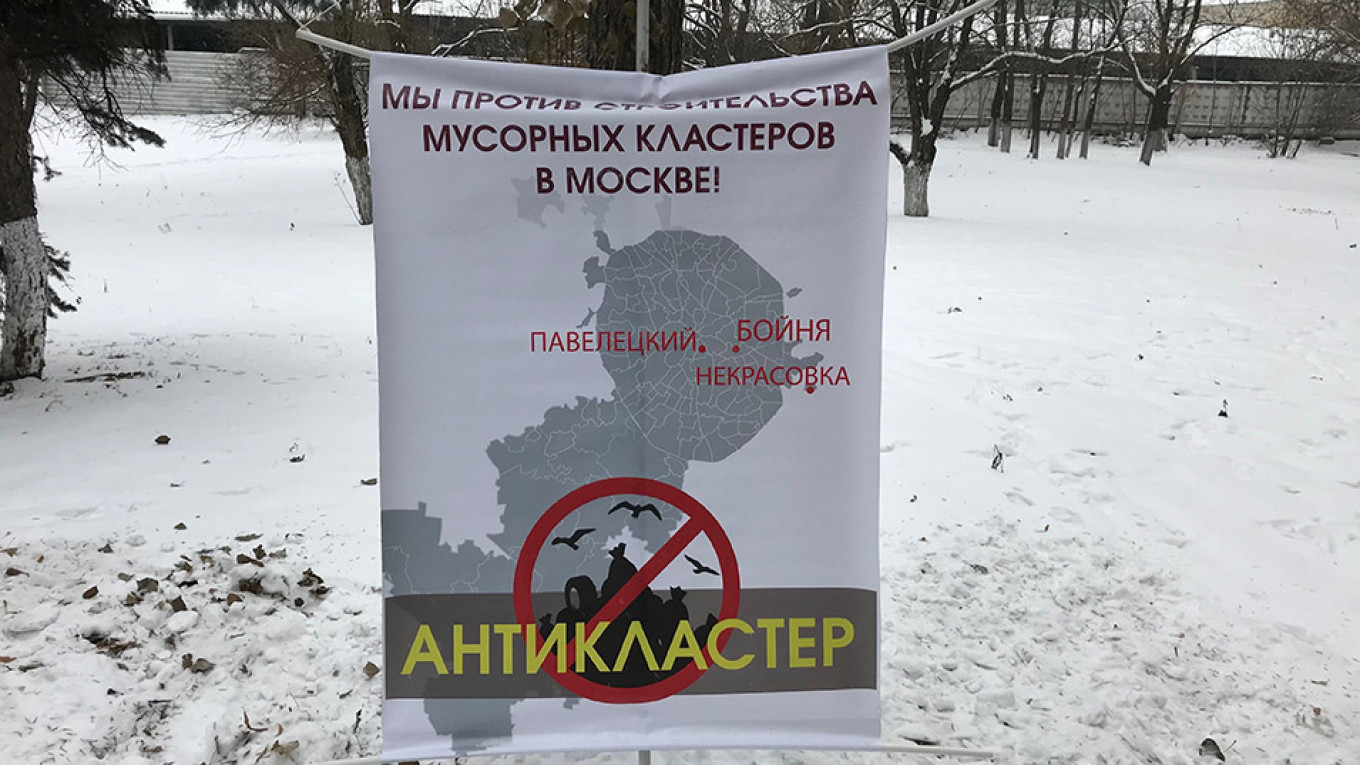
But then, at a trade show in Munich this May, Anjsber says Russians suddenly showed “a lot of interest” in the product: a machine that compacts trash and packs it into polyethylene sacks, reducing transportation costs.
Anjsber’s Sweden-based company, Flexus Balasystem, has since delivered three of the machines to Russia. The fourth is due to be delivered by the end of this month.
While the advertising video for the Shies ecotechnopark emphasizes that the technology is used by European countries, Anjsber says that his clients typically use the system for “transportation and short-term storage before processing the waste or using it to create energy.”
But he also says that, while he does not direct clients on how to use his technology, he believes his bales can store waste safely for a “very long time.”
In a phone interview, Vladimir Burmatov, the Chairman of the State Duma’s Ecological Committee, said that federal officials are supportive of Moscow’s decision to transport waste to other regions, calling it “necessary.” He also said St. Petersburg and the city of Sevastopol on the Crimean peninsula are working on similar measures.
Nonetheless, Burmatov, a ruling United Russia party deputy, said that, ultimately, “the main opportunity for Moscow” in terms of waste management is “garbage processing and the utilization of waste.”
Indeed, from a longer term perspective, President Vladimir Putin has pledged to build 220 waste processing plants across the country by 2024. His plan calls for 60 percent of Russia’s solid household waste to end up at those plants.
It is, however, a herculean task: According to the Natural Resources and Environment Ministry, 90 percent currently ends up in landfills.
A stalled revolution
The plan also raises doubts among critics of Russia’s waste management systems.
Alexei Kiselyov, the director of Greenpeace Russia’s toxics campaign, says that Russia already has the blueprints in place for effective waste management. What the country lacks is the initiative to carry it out.
He points to legislation that Putin signed into law on Dec. 21, 2014, which prioritized the maximum use of materials, the reduction of waste — hazardous and nonhazardous — waste treatment and recycling.
“This was the first time Russia indicated that recycling and waste control were of the highest priority,” Kiselyov says. “It was a garbage revolution.”
But the ideas laid out in the legislation have not been implemented, he says, and regional officials are carrying on business as usual.
Kuznetsov of the Center for Ecological Initiatives explains that officials have stuck to the status quo because they are incentivized to collect as much unsorted trash as possible.
“Most regions have a standard figure for each person’s annual waste production and budget allocated to dealing with it,” he says. “If the standard production per person is lowered, then the authorities will earn less money. If the waste is sorted and some of it doesn’t make it to a landfill, then they’ll also earn less money.”
“These officials, their children all live in Europe, and they regularly vacation there,” he adds with frustration. “They clearly know what a well-implemented recycling system looks like and what the benefits are.”
The first necessary step, say both Kiselyov and Kuznetsov, is to sort waste into different bins at home. They also recommend installing garbage disposal units in kitchen sinks for food waste, which they estimate accounts for about 30 percent of all waste produced in Moscow.
“Moscow could become like San Francisco in just three to five years,” says Kiselyov.
A political opportunity
But with the current authorities in charge, says Kuznetzov, that dream is unlikely.
He points to whiffs of corruption in the development of echotechnoparks.
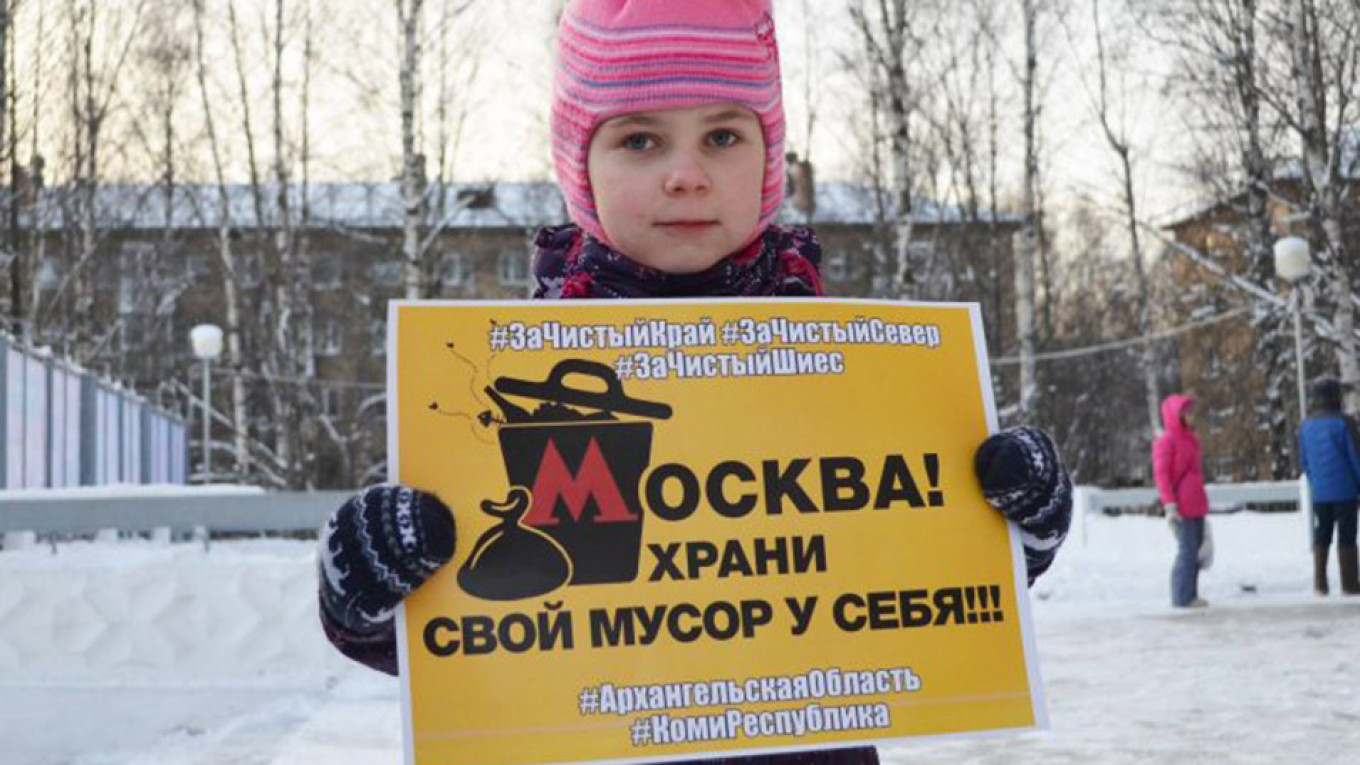
Last month, the Meduza outlet reported that the lucrative contracts to develop the facilities had been awarded to companies linked to Moscow City Hall. The article added that the tenders — worth a reported 10.5 billion ($157.5 million) for the Arkhangelsk facility alone — had not been made public, excluding any other companies from bidding.
At the protests outside Moscow on Sunday, an activist from Arkhangelsk said he believes that modern Russia is encapsulated in the waste crisis.
“I see all of our root problems in the way the officials are handling this,” Dmitry Kuznetzov, a 35-year-old small business owner who said he only became so civically engaged two weeks earlier, told the crowd. “That’s why I am calling for us to unite in countrywide protests.”
The protests, however, appear unlikely to stop the plan from progressing.
Outside the entrance to the Nekrasovka ecocluster on Dec. 9, a security guard told The Moscow Times that Deputy Mayor Pyotr Biryukov had inspected the facility the day before; that Mayor Sergei Sobyanin was expected to visit the next day; and that, as far as he knew, the facilities are expected to begin operations by the end of this month.
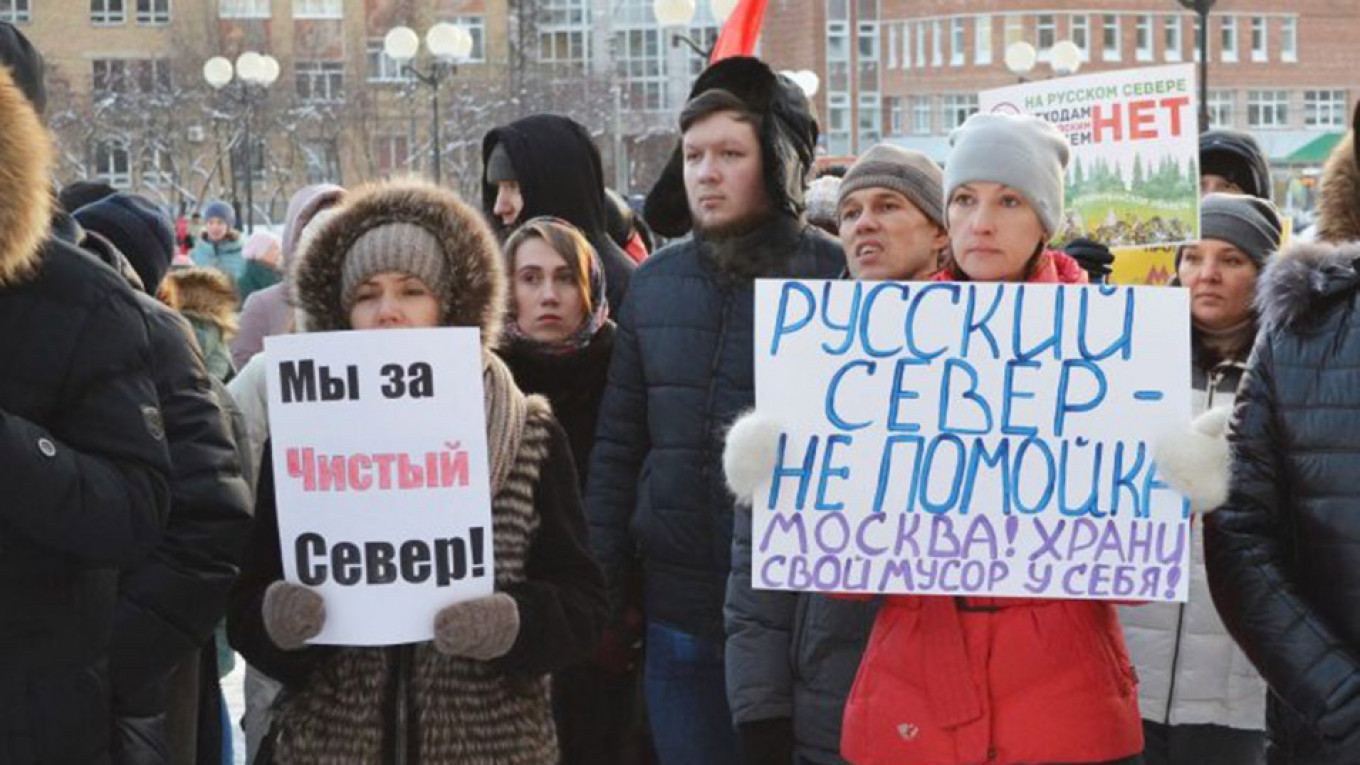
Nonetheless, some, like Nikolai Lyaskin, an aide to opposition politician Alexei Navalny and his campaign chief during his 2018 presidential run, see a long-term political opportunity.
“I see this as something we can take advantage of,” Lyaskin said at the scene of the Dec. 9 protest. “We have all these people organized across the country from our presidential campaign and people are looking for a party that can represent them on this question.”
For political analyst Yekaterina Schulmann, that view is perceptive. She pointed to a recent poll by the Presidential Human Rights Council that found that the right which respondents felt was most violated by the authorities was their environmental safety.
“No one as of yet has taken this on substantially,” Schulmann says. “But this will be an important topic over the coming years. People are worried about this topic and they will listen closely to someone who comes offering solutions.”
A Message from The Moscow Times:
Dear readers,
We are facing unprecedented challenges. Russia's Prosecutor General's Office has designated The Moscow Times as an "undesirable" organization, criminalizing our work and putting our staff at risk of prosecution. This follows our earlier unjust labeling as a "foreign agent."
These actions are direct attempts to silence independent journalism in Russia. The authorities claim our work "discredits the decisions of the Russian leadership." We see things differently: we strive to provide accurate, unbiased reporting on Russia.
We, the journalists of The Moscow Times, refuse to be silenced. But to continue our work, we need your help.
Your support, no matter how small, makes a world of difference. If you can, please support us monthly starting from just $2. It's quick to set up, and every contribution makes a significant impact.
By supporting The Moscow Times, you're defending open, independent journalism in the face of repression. Thank you for standing with us.
Remind me later.



